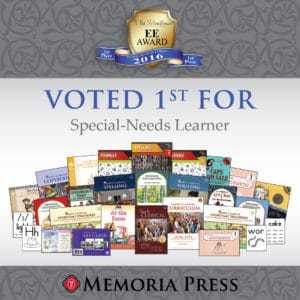Cheryl Swope's Blog, page 11
September 14, 2017
Special Needs in Classical Schools: Keeping Families Together!
Q: “My children attend a classical Christian school and we love it. However, I’ve realized that several families in our school have felt it necessary to split their families with regard to schooling because our school does not have classes for children with special needs. I am considering having some of our board members, teachers, and parents read your book with me to consider beginning such a program. Do you know of any classical Christian schools with special needs programs?”
A: Yes! See the list below.
Two highlights:
1. You can create an effective classical school-within-a-school model, Imago Dei School.
2. Or you can improve your own classical inclusion model with extra assistance to students and good support for their teachers.
As you may know, Memoria Press now offers six levels (with more to come) of the multi-sensory, research-based Simply Classical Curriculum for children with special needs. This could be a place to start. Homeschoolers are teaching from this special-needs classical curriculum with remarkable success, so special training may not be as important as a willingness to teach children who need modifications, a slower pacing, and extra encouragement.
Here are a few other examples. This is just a partial list:
GreatHeartsAmerica.org
Classical Academies
Vanguard Classical Charter
Where to begin? A “book club” in-service with interested school board members, volunteers, parents, and prospective teachers can be an effective way to begin. We offer bulk discounts of the book Simply Classical: A Beautiful Education for Any Child for just such a purpose. Contact me privately, cherylswope@memoriapress.com, and I will connect you with someone from Memoria Press who can offer you special bulk pricing.
Which classical schools am I missing? We love to hear about these programs. If you know of more, please let me know!
July 26, 2017
NEW Myself & Others: Lessons for Social Understanding, Habits, & Manners
From Memoria Press, the leader in classical teaching resources for challenged children, a new resource will release soon. Not just for special needs, “Myself & Others” is a Simply Classical Resource for teaching social skills, healthy habits, and manners in the home and school. Literature-rich with practical lessons, the first of these 14-week programs is scheduled for release in 2017! Suitable as a stand-alone set of lessons for a single semester, summer, or separate unit on character development, this program was created by request. I have seen the formatted draft and cannot wait to share this! We will post to SimplyClassical.com and elsewhere when it releases.
Myself & Others: Lessons for Social Understanding, Habits, & Manners
A Simply Classical Resource
Learn a little bit more here and a little more here. Suitable for charter schools, cottage schools, home schools, special or resource classrooms, and more ….
July 20, 2017
Resources to Help & Encourage Writers
Resources to Help & Encourage Writers
Writing is the solitary pursuit that, ironically, can connect us deeply as human beings.
Whether you are an avid blogger, published author, or writer in your own quiet journal, where do you prefer to write? How do you find the time? Is “life” a handmaiden to writing, or a devious interruption? A few months ago, beloved Lutheran fiction author Katie Schuermann and I discussed answers to these questions in her podcast. We invite you to listen here.
Before I ever submitted my first manuscript, I read many books on writing. And, because I homeschooled twins at the same time, I read books on how to find time for writing! We could not cover all of my most dog-eared books on writing in the podcast, so you will find these titles here…. Keep reading.
June 25, 2017
New — Level 3 of Simply Classical Curriculum Has Released!
Take the online readiness assessments to determine where to begin.
Choose select resources or teach from the entire 34-week set of efficient teaching resources and lesson plans. Simply Classical Level 3.
Contact Cheryl Swope, M.Ed. or email sales@memoriapress.com, if you have any questions!
C’est Sa Raison d’Etre
My daughter works each week in a nursing home. She helps me at home with dusting, folding laundry, and making beds. She feeds her cat and cares for the neighbor’s dog. She takes ballet, enjoys art, plays sports, listens to music, goes to the library, and takes walks with her brother. She cheers all of us.
But this is not the plan she had for her life. Autism, schizophrenia, and a series of medical conditions thwarted that plan. Virtue. Duty. Wisdom. Classical educators often speak of these things. Sometimes we witness them.
Courage
One afternoon before her regular blood work, Michelle settled into a good book in the back seat of our car. She seemed unconcerned about the painful needles invariably wielded by rookie phlebotomists. All of this awaited her but she pressed on, as she does every day.
As I watched her through the rearview mirror, I decided to tell her what I had been thinking. “Michelle,” I said, “I want you to know how much I admire your courage.” Surprised and somewhat embarrassed, she covered her face with her hands. Then she looked up and paused. She answered quietly, “C’est sa raison d’être.”
“What does that mean?” I asked.
“That is her reason to be,” she explained. “I learned it in First Start French.”
More
On another day, she read a poem, “The Grasshopper,” by the Greek of Anacreon from Poetry for the Grammar Stage. Michelle answered these questions independently in her Student Book: “Would you prefer a life like the grasshopper’s? Why or why not?”
She wrote her answer this way: “I would if it’d get me away from certain things. But we are what we are, and must learn to accept and bear them. ‘Tis the way of the cross. To live and learn, to serve where you are able.”
I sat down to read this again more slowly. The words, simply written, echoed timeless truths.
This is courage in a man
To bear unflinchingly what heaven sends. —Euripedes
Though He slay me,
yet will I trust Him. —Job 13:15
We never know which lessons will impact our children as we teach. We do not know when these lessons will emerge in our children’s lives, reflections, or conversations. We do not know whether they will emerge at all. We just keep teaching, caring, and serving. For each of us, that is our reason to be.
April 20, 2017
Lifelong Burden … Or Blessing
This morning my son and I discussed literature. Specifically, we noted a good author’s ability to challenge and strengthen the mind and character in ways mere escapist entertainment never can.
Michael wants to protect his mind, because he fears the long-term prognosis of some of his conditions. He does not want to lose the ability to think or to read, as sometimes happens with degenerative disabilities. I promised him he will be well served to continue reading good books. Reading good literature will help protect his mind.
I pray for stronger minds for both of my children. As parents of special-needs children understand too well, my children’s prognosis is on my mind too. This helps keep me steadfast in teaching them, caring for them, and loving them.
I recently spent several days in the Memoria Press office working on the new special-needs curriculum packages. My children were back home in Missouri. I thought of them often; however, I did not want to call so soon and make them miss me. Even as young adults, my children’s special needs often leave them vulnerable.
So I had some quiet time on my hands in the evenings. Unaccustomed to quiet time in the evenings, suddenly I needed a book to read. (I learned that when you find yourself in Kentucky with no book to read, Martin Cothran will reach into the trunk of his car and give you a book or two by Kentucky’s own novelist and essayist Wendell Berry.)
That first evening back in my suite, instead of calling home, I entered Wendell Berry’s stories. The forced slowing of thought, where reading yields to contemplation, led me to welcome those hours. The characters spoke with such a casual wisdom, they reminded me of gentle insights my 100-year-old grandma shared with me without ever intending to be wise.
In “Pray Without Ceasing,” a conversation unfolds in a farm kitchen. The grandmother describes a horrible day long ago, when she had learned of a tragedy. “Oh,” she said, “I felt it go all over me, before I knew it in my mind. I just wanted to crawl away. But I had your mother to think about. You always have somebody to think about, and it’s a blessing.”1
As long as our children live, especially our children with special needs, we will always have somebody to think about. And it’s a blessing.
Wendell Berry. Fidelity, “Pray Without Ceasing,” 38.
Originally published in The Classical Teacher Spring 2017 edition
February 17, 2017
Award Winning Simply Classical Curriculum — 1st Place in Special Needs!

Teach your special-needs child with confidence.
You can do this!
Simply Classical Curriculum, ClassicalSpecialNeeds.com — Everything you need for a full year of Excellence in Education for your child(ren).
Free online readiness assessments, free online support @ SimplyClassical.com
December 16, 2016
For Body & Soul: Confirmation Resources for Special Needs
Books
Video
Audio
Articles
Recent Articles
Faith
For Special Needs
Guest Articles
On Classical Education
Reflections
What’s New – Resources
Curriculum
Forums
Events
Special Needs
Teaching Resources
Reference Books
Organizations, Support, & Info
For Lutherans
Reviews
I love to hear of pastors willing to bring Christ to children with special needs!
For the mildly challenged child, you may need to modify in only three ways:
Require only a few key verses to be memorized.
Conduct classes orally and allow oral responses to your questions.
Teach with visual cues to accompany spoken terms.
For the more significantly challenged child, such as those with intellectual disability, I recommend considering these resources:
1. For teaching the Six Chief Parts, each book explains one of the six parts. This set is very catechetical and may serve you well.
2. For teaching the words of our Christian faith, consider this book: Our Faith from A to Z. The format is highly visual and accessible, which will be important, given her hearing difficulties.
3. For biblical literacy, you can read aloud — or assign her parents to read aloud nightly — The Story Bible. To cultivate a habit of prayer, simply have them engage her in the brief but good prayers that accompany each story.
4. I have not used this, but you can take a look at this program for individuals with special needs to prepare them for Holy Communion: Simplified Catechism.
5. Perhaps you have already seen this: Building on the Rock. I have not taught from this program, but if you want something pre-packaged, this program might interest you.
General tips:
-Be sure the student wears any needed glasses or special hearing devices beginning any class.
-Do not require the student to write sentences. You might have her draw something to indicate (or to promote) understanding. For example, drawing drops of water, a Bible, and an arrow between them to demonstrate Holy Baptism is not mere water, but water connected to the Word. You might draw this on the board and have her copy. Or she might trace your drawing on paper with a yellow highlighter.
-Conduct your classes orally, face to face, one-on-one. Allow her parent(s) to be present in the room, if this helps the student.
-Be rich in presentation with verses from God’s Word. While our theological terms (justification, propitiation) may not “stick,” God’s Word is powerful unto salvation.
-Even though you will teach many verses of Scripture throughout her classes, select one especially rich Scripture verse for special emphasis. Teach this same verse every session. Review the verse at the beginning and end of each class one word or phrase at a time. [Example: “The Lord” – she repeats “The Lord” — do this the first class, several times. Next time “is my shepherd” – she repeats “is my shepherd.” When she is read, put them together, “The Lord is my shepherd.” Increase the length of the verse, as long as she can master it.] The verse you select can become her confirmation verse. If needed, this can also become her sole memory verse for reciting on her confirmation day. Create pictorial clues for phrase flash cards, and have her parents work on it at home, if needed.
-Similarly, teach her the refrain or closing verse of one hymn. Sing this hymn to open or close every class with her. Have her sing with you on the portion she knows.
-Focus on your Words of Institution. Jesus says, “This is my body, .. this is my blood.” Have the elements of the holy sacrament present in each class. Review this key message every week. After all, this is the heart of confirmation, the purpose of your instruction: her understanding that in the Lord’s Supper, she receives Christ’s body and blood for her own forgiveness. Teach the pro me aspects of holy communion, and repeat this over and over, every class. “(Her name), this is given for you, for the forgiveness of your sin.”
Even though all of this will be very challenging, you may find it refreshing to break down confirmation class into its most essential, life-giving basics.
If you need anything, or if you have questions or concerns regarding anything here, feel free to follow up or leave a comment. I have two such children and a master’s degree in special education. I firmly believe we need more resources for our pastors. Until then, I hope some of the above is helpful.
You may also want to point out to the student’s parents or school personnel that we now have a full year-long academic curriculum designed just for children with special needs. Our biblical literacy books are from Concordia Publishing House.
They might also appreciate the book on which the curriculum is based, Simply Classical: A Beautiful Education for Any Child, foreword by Dr. Gene Edward Veith.
Search by category:
Recent Articles | Faith | For Special Needs | Guest Articles | On Classical Education | Reflections | What’s New - Resources
The educational and medical information on this website is provided “as is” without any representations or warranties, express or implied. Please see the Disclaimer.
WELCOME
Books
Video
Audio
Articles
Recent Articles
Faith
For Special Needs
Guest Articles
On Classical Education
Reflections
What’s New – Resources
Curriculum
Forums
Events
Special Needs
Teaching Resources
Reference Books
Organizations, Support, & Info
For Lutherans
Reviews
December 8, 2016
Hope for the Worried Child
What to Do (and Not Do) When Children Are Anxious
Anxious Kids: Are You Dealing with an Insecure Teen?
You might also work through some chapters in this book: Helping Your Anxious Child: A Step-by-Step Guide for Parents. The author takes a cognitive approach with topics like “Detective Thinking” to help the child detect (and allay) his own anxiety-inducing thoughts.
For older grammar school or middle-school students, it might be time to introduce a new “class,” perhaps once a week, with written or oral exploration of these topics, No pressure, just curious discussion. If the student is not a strong reader, you could work through some of the chapters yourself, and then present one or two exercises that might apply.
The Worried Child
What to Do (and Not Do) When Children Are Anxious
Anxious Kids: Are You Dealing with an Insecure Teen?
You might also work through some chapters in this book: Helping Your Anxious Child: A Step-by-Step Guide for Parents. The author takes a cognitive approach with topics like “Detective Thinking” to help the child detect (and allay) his own anxiety-inducing thoughts.
For older grammar school or middle-school students, it might be time to introduce a new “class,” perhaps once a week, with written or oral exploration of these topics, No pressure, just curious discussion. If the student is not a strong reader, you could work through some of the chapters yourself, and then present one or two exercises that might apply.
Cheryl Swope's Blog
- Cheryl Swope's profile
- 8 followers




